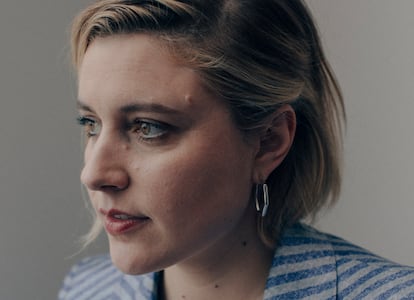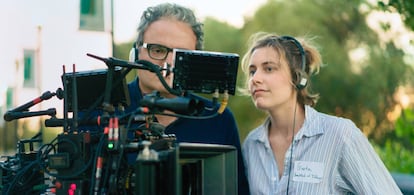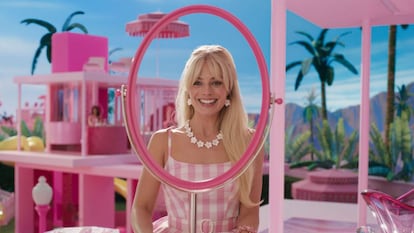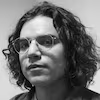Greta Gerwig at 40: a unique kind of American writer
From ‘Hannah Takes the Stairs’ to ‘Lady Bird’ and ‘Barbie’, Gerwig has developed an idiosyncratic style that integrates complex themes into simple settings

Greta Gerwig –who celebrates her 40th birthday today– first gained recognition as an actress at 27 after starring in the film Greenberg alongside Ben Stiller, directed by Noah Baumbach. However, writing had always been an integral part of her artistic development and it quickly became a focus after finding her place in cinema.
While studying English and philosophy at Barnard College, she landed a minor role in Joe Swanberg’s second feature, LOL, which marked the beginning of her writing partnership with Swanberg. They later collaborated on Swanberg’s film Hannah Takes the Stairs, in which Gerwig also starred as a college graduate torn between three different men.
Hannah Takes the Stairs received mixed reviews from critics, but many praised the script’s realistic tone. Reece Goodwin, curator of the ACMI, wrote about the film: “So naturalistic are the performances that the line between character and actor feels fuzzy: how much of Hannah are we seeing on screen, and how many idiosyncrasies are Greta Gerwig’s own?” This question resurfaced in discussions about subsequent projects like Frances Ha, which she co-wrote with her partner Noah Baumbach, and Lady Bird, which she directed, as Gerwig seemed to incorporate parts of reality into her works.
Gerwig and Swanberg collaborated again on Nights and Weekends, with Gerwig taking on the role of director as well. The film explores the complexities of a long-distance relationship and resonates with the uncertainty about the future that is recurrent in Gerwig’s work, especially in Lady Bird, which many consider her most accomplished project.

Following Nights and Weekends, Gerwig co-wrote and starred in Northern Comfort alongside Rod Webber, known for his improvisational films and documentaries. The film, made with a low budget and a DIY approach, tells the story of two travelers who meet in Canada and their encounters along the way. Gerwig expressed her interest in low-budget filmmaking due to the collaborative opportunities it provided, helping her further develop her unique voice and style as a writer and director.
After her successful collaborations with Joe Swanberg, Gerwig’s career took a significant turn with the release of Frances Ha –which she co-wrote with Noah Baumbach. She also starred as another confused character: a 27-year-old dancer who is trying to find her way in the world.
The movie garnered critical acclaim and solidified Gerwig’s reputation as a talented screenwriter and actress. It showcased her ability to infuse her characters with authenticity and depth, blurring the lines between fiction and reality. “I put a lot of myself in there, but also I took from a lot of people. [...] Only I could’ve created (Frances),” she said to Lily Rothman in an interview about the film. She later co-wrote Mistress America with Baumbach.
Lady Bird
Gerwig’s most personal work came with the Academy Award-nominated script of Lady Bird, which she spent several years developing. Although the writer and creator has clarified that it is not auto-biographical, she said to IndieWire: “(The film) has a core of truth that resonates with what I know,” and that it is a “love letter to Sacramento,” where she was born and raised. As a director, Gerwig used several places from her past, and told Sam Levy that she wanted the film to look “like a memory.” The film received several accolades and Gerwig was also nominated for Best Director at the Academy Awards.
Before the success of Lady Bird, Gerwig was hired to write a new adaptation of Louisa May Alcott’s classic Little Women. During a Directors Roundtable, The writer and director said “That book meant so much to me. I don’t remember not knowing who the March sisters were. (...) They became part of the inner landscape of myself. They felt like my memories.” Anthony Lane of The New Yorker later wrote: “(Little Women) may just be the best film yet made by an American woman”, while other critics highlighted the script and how the story, despite not being an original work, still shows more about Gerwig’s vision as a writer and as a director. “Little Women”, Richard Brody wrote, “is just such a work of poetic smuggling: a movie made within the norms of the industry that also reflects Gerwig’s own personal artistic ideas, ideals, and obsessions.”
Barbie

With the career Gerwig created for herself, at that point it seemed an odd decision to take over a then untitled Barbie project inspired by the famous blonde doll. However, the success of the film has proved that there was no better choice. “I wanted to make something anarchic and wild and funny and cathartic,” she said to The New York Times, “and the idea that it’s actually being received that way, it’s sort of extraordinary.”
Gerwig was approached by Margot Robbie –who joined as producer of the film after being cast as the main character– after seeing Little Women and gave her complete creative freedom, something one wouldn’t expect from a studio that wants a film about a toy. This liberty allowed her and Noah Baumbach –once again his co-writer– to explore familiar ideas and use influences that range from Jacques Demi’s classic The Umbrellas of Cherbourg to Pedro Almodovar’s Women on the Verge of a Nervous Breakdown to Tim Burton’s Pee-Wee’s Big Adventure, while mocking capitalist ideals, exploring themes like existentialism, individualism, feminism and masculinity.
While Barbie could’ve been just another forgettable summer big studio project, it showed that even in a commercial project, a writer and director like Gerwig could infuse depth and thought-provoking ideas, leaving audiences discussing the themes for even days after leaving the theater.
As she approaches her fourth decade, it will be intriguing to see which projects Gerwig chooses to develop and the themes her scripts will explore. One upcoming project is a live-action adaptation of Snow White, co-written with playwright Erin Cressida Wilson, set to be released in March 2024.
Sign up for our weekly newsletter to get more English-language news coverage from EL PAÍS USA Edition
Tu suscripción se está usando en otro dispositivo
¿Quieres añadir otro usuario a tu suscripción?
Si continúas leyendo en este dispositivo, no se podrá leer en el otro.
FlechaTu suscripción se está usando en otro dispositivo y solo puedes acceder a EL PAÍS desde un dispositivo a la vez.
Si quieres compartir tu cuenta, cambia tu suscripción a la modalidad Premium, así podrás añadir otro usuario. Cada uno accederá con su propia cuenta de email, lo que os permitirá personalizar vuestra experiencia en EL PAÍS.
¿Tienes una suscripción de empresa? Accede aquí para contratar más cuentas.
En el caso de no saber quién está usando tu cuenta, te recomendamos cambiar tu contraseña aquí.
Si decides continuar compartiendo tu cuenta, este mensaje se mostrará en tu dispositivo y en el de la otra persona que está usando tu cuenta de forma indefinida, afectando a tu experiencia de lectura. Puedes consultar aquí los términos y condiciones de la suscripción digital.









































